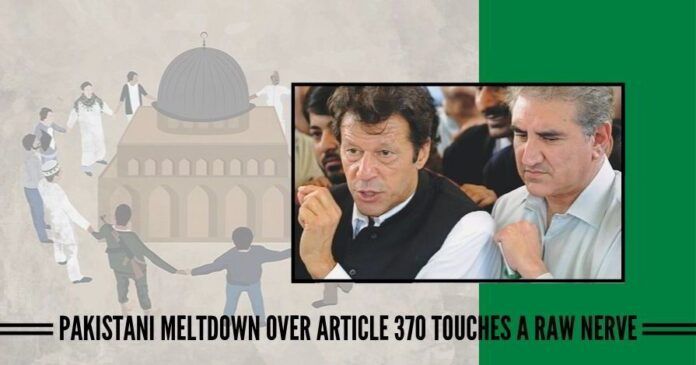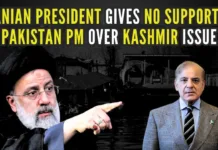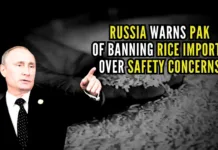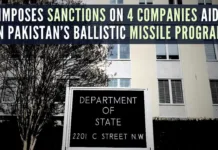
As Arab countries heap Narendra Modi with honours and awards, Pakistani commentators point out Pakistan’s view of itself and Muslim Ummah was a lie in a tissue of lies.
A lot of news and commentary coming out of Pakistan since 05 August revocation of Jammu and Kashmir’s special status reveals Islamic myths, hatred, terror, and everything else that lies at the root of the fraudulent and genocidal partition imposed on India in 1947.
It was reported on 10 August, for instance, that Pakistani media watchdog PEMRA issued an ‘advisory’ to TV channels and radio licensees, which included a request to “project” the “two-nation theory”.
(Since the ‘two-nation theory’ postulates mutually incompatible Hindu and Muslim ‘nations’ and was used to carry out ethnic cleansing of non-Muslims in Muslim-majority regions, it would be naïve to wonder what has goody-goody, ‘Sufi’-inspired ‘Kashmiriyat’ got to do with this pernicious theory – almost as naïve as wondering whether peaceful young man Burhan Wani with his peaceful guns, hand grenades and rocket launchers was peacefully fighting for peaceful Islam or peaceful ‘Kashmiriyat’!)
It’s as if it was not Kashmir itself but Article 370 of Indian Constitution that was Pakistan’s ‘jugular vein’! Isn’t it an amazing revelation for all Indians that Pakistan’s ‘jugular’ vein has all along been in their hands (in their Constitution to be precise)?
Pakistan’s military establishment issued a statement – to take another example – that “Kashmir is our jugular vein and we will go to any length to protect it.”
Describing the valley, an Indian territory, as its ‘jugular vein’ has been an age-old slogan employed by the Pakistani establishment to mobilize Pakistanis for a continual terrorist invasion of Kashmir.
The original use of the metaphor ‘jugular vein’ for Kashmir came, according to Pakistani claims, from Muhammad Ali Jinnah, who led Muslim League’s genocidal campaign for the creation of Pakistan.
Another age-old slogan is Kashmir Banega Pakistan (‘Kashmir will become Pakistan’), which comes ironically from a country that claims that it stands for the ‘right to self-determination’ of the Kashmiris (not to mention a country that is in illegal occupation of parts of Indian state of J&K, that has destroyed the demographic profile of the occupied territories, and that denies civil rights to the original inhabitants of those territories.)
A number of Pakistani commentators howled: “India has cut off our jugular vein” (and almost expected their Arabic-speaking Allah to take a break from his busy routine of sanctioning 72 houris each for the Jannat-bound Muslim men to shower his wrath on the non-Muslim Indians!)
It’s as if it was not Kashmir itself but Article 370 of Indian Constitution that was Pakistan’s ‘jugular vein’! Isn’t it an amazing revelation for all Indians that Pakistan’s ‘jugular’ vein has all along been in their hands (in their Constitution to be precise)?
(And now that this ‘jugular vein’ has been cut the Islamic Republic of Pakistan should be in the final stages of its existence – not to mention its all-weather friends among Indian politicians and commentators who’ve actually been screaming since 05 August as if they are being tortured to death!)
Since 05 August, there has been a significant amount of commentary in Pakistani media, particularly the Urdu language media, which nails the obvious falsehoods in Pakistani establishment’s narratives.
(One would expect the ‘mainstream’ Indian media outlets to translate this kind of commentary into languages more widely understood in India and then go to town with it. But no! They are too befuddled with their own fake narratives and too stupid to be able to see the need!)
For the upholders of the Ideology of Pakistan, the existence of Pakistan is defined only in relation to Hindus, and hence the Hindus have to be painted as negatively as possible.
The most interesting of such commentary goes beyond Kashmir to expose the fraud lying at the heart of Pakistan’s creation and sustenance, particularly the notion of ‘Ummah’ or the worldwide ‘community’ or ‘brotherhood’ of Muslims.
A number of Pakistani commentators pointed out that ‘Ummah’ was once again exposed as a “myth” when United Arab Emirates (UAE) and Bahrain, “instead of supporting their ‘Muslim brothers’ in Kashmir after 05 August,” conferred awards on Indian Prime Minister Narendra Modi.
“The bubble of an Islamic ummah has burst,” Pakistani scientist and commentator Pervez Hoodbhoy quoted former Senate chairman Raza Rabbani as saying in a discussion on the scrapping of J&K’s special status.
The myth of ‘Ummah’ has been used by the Pakistan establishment to continue its misrule, remarked senior journalist Raza Ahmad Rumi.
The bubble of ‘Ummah’ has burst multiple times in Pakistan – most notably in 1971 when Muslims of West Pakistan massacred and raped Muslims of East Pakistan (not to mention the non-Muslims), resulting in the creation of Bangladesh – and yet it survives.
It’s because ‘Ummah’ is part of that grotesque maze of falsehoods called Islam, which Pakistani establishment calls its raison d’être.
Propagandizing Pakistani people into this maze of falsehoods is partly achieved through ‘Pakistan Studies’ (Urdu: Muṭāla e-Pākistān मुतालआ-ए-पाकिस्तान) which has been described by Wikipedia as “the name of a curriculum of academic research and study that encompasses the culture, demographics, geography, history, and politics of Pakistan”.
‘Pakistan Studies’ is one of the three compulsory courses (along with the Urdu and English language courses) at the secondary school and higher secondary school levels of education in the country says Wikipedia.
It is also taught as a degree course at most of the social science departments in many universities, and is a tool for promoting the so-called ‘ideology of Pakistan’.
“Associated with the insistence on the Ideology of Pakistan has been an essential component of hate against India and the Hindus. For the upholders of the Ideology of Pakistan, the existence of Pakistan is defined only in relation to Hindus, and hence the Hindus have to be painted as negatively as possible,” says a study conducted by the Sustainable Development Policy Institute (SDPI), titled ‘Subtle Subversion: The State of Curricula and Textbooks in Pakistan’.
It’s hard to tell what has caused more pain to Pakistanis — Niazi government’s failure on Kashmir or the Islamic community’s indifference.
‘Pakistan Studies’ is an important reason why even those Pakistanis who receive their education outside the madrasa system often tend to look, sound and behave like Islamic barbarians.
The rest of this article is made up of two amazingly candid pieces of commentary on the myth of Ummah by Pakistani intellectuals Kashif Baloch and Jamshed Iqbal.
Both are video commentaries in Urdu, produced by Punjab Lok Sujag, a Pakistani NGO.
For the benefit of readers who don’t understand Urdu, this article gives an English translation of the two commentaries.
Each of the two commentaries has also been provided with some hyperlinks, allowing the reader to access explanatory or more detailed information.
The readers, who don’t understand Urdu but have a working knowledge of Hindi, are encouraged to read the Devanagari transcript of each of the two video commentaries along with its English translation, and then watch the video.
Here’s Kashif’s Baloch commentary, which was published 27 August, followed by Jamshed Iqbal’s, which was published on 31 August.
‘Pakistan needs a Truth and Reconciliation Commission to probe loss of culture and identity’
For the last 70 years, Pakistanis have been pushed into a fool’s paradise in which – they were told – they’re fighting the ultimate battle between Islam and Kufr, says Pakistani journalist Kashif Baloch in a video commentary that captures the mood of the nation following Imran Khan Niazi government’s international isolation on Kashmir.
The Pakistanis were told they were part of the worldwide Muslim Ummah and inveigled into “pleasing” the Arabs by “changing” not only their language and lifestyle but their entire cultural identities, says Kashif Baloch who works as Editor (Audio, Video) for Sujag magazine published by Punjab Lok Sujag, a Pakistani NGO. (He has worked previously for Dawn News and BBC.)
What Pakistan needs now is a Truth and Reconciliation Commission tasked with enquiring into the factors that robbed the Pakistanis of their culture, their social harmony, their tolerance, and their ways of living, says Kashif Baloch.
It’s hard to tell what has caused more pain to Pakistanis — Niazi government’s failure on Kashmir or the Islamic community’s indifference.
Perhaps the greatest pain has been caused to us by the realization that we’ve been living for the last seven decades in a fool’s paradise — something that the champions of Tabdeeli (change) have let slip in an attempt to cover up their failures.
Promise us, Imran Khan Niazi Sahib, that you’ll set up the commission intended solely to find out as to who were the people who robbed us of our culture, our social harmony, our tolerance, and our ways of living.
We thought it’s a war between Islam and Kufr (infidelity).
We laboured under the illusion that Muslims from the banks of Nile to the land of Kashgar stood by us — that Arabs, as well as non-Arabs, were with us.
And the great lengths we went to in order to get into the good books of the Arabs!
We disowned our ancestors, stifled our cultural identity, changed our names, changed our curricula, changed our language, changed our attire, changed absolutely everything.
What did we get in return?
Only this lecture from the Niazi government that our problems are one thing and Ummah’s interests are quite another! This consolation from the ‘Government for Change’ that we should not become too emotional on the issue of Kashmiri brothers!
OK, Imran Khan Niazi Sahib, we’ll bear with you and accept your limitations as well as ours.
But can’t we expect you to do something, at the very least, to assuage the public disgrace that we’ve been suffering in the world community?
You could promise us, at the very least, that you’ll get an official investigation done to identify the people who turned Pakistan into a laboratory and Pakistanis into guinea pigs to the point where we’ve been cut off from the whole world and pushed into living in what you call a fool’s paradise.
You could promise us, at the very least, that you’ll set up a Truth and Reconciliation Commission to find out at whose behest we’ve been made to prepare generations after generations of people who stand at every street-corner of Pakistan and hurl slogans of Kafir, Kafir.
Promise us, Imran Khan Niazi Sahib, that you’ll set up the commission intended solely to find out as to who were the people who robbed us of our culture, our social harmony, our tolerance, and our ways of living.
Just these promises, Imran Khan Niazi Sahib, will go some way towards consoling the nation that is currently in a state of shock.
You could always go back on your promises later — do another one of your U-turns. These U-turns are, after all, what made you the Prime Minister, even if a ‘selected’ one!
We acted as if Pakistan Studies was taught all over the world, everyone thought like us, and every Islamic country had held the Muslim identity to be more important than other identities.
‘Yes, we have been lied to, all along!’
The fact that most of the Muslim countries of the world chose not to support Islamabad on the issue of Kashmir has not only made Pakistan’s “identity crisis” more obvious but has also shocked the masses who feel they have all along been told a lie called ‘Ummah,’ says Pakistani writer Jamshed Iqbal in a video commentary.
Ever since the days of the Pakistan Movement, the people of the region (that would subsequently become Pakistan) have been emotionally manipulated into acting as if their Muslim identity overrode all other identities, says Iqbal who describes himself as “a peacebuilder, trainer and development communication expert, working with several national and international organizations in the areas of peace-building, non-violent resolution of faith and identity based conflicts”.
No part of the world has seen such an obsession with Muslim identity as this region, suggests Iqbal, resulting in Pakistanis’ retreat into a “fool’s paradise” – or a make-believe world in which they were encouraged to view foreign invaders of yore as their heroes.
This make-believe world has robbed Pakistanis of their history as well as their cultural heritage, turning them into rootless people, says Iqbal who has at least 10 publications to his credit.
Recent events – especially the fact that Muslim countries in general and Arab countries, in particular, are not supporting Pakistan on the Kashmir issue – have made our identity crisis even more obvious.
This identity crisis has become even more evident because we the people of this region have hitherto been told that the most important of our identities, overriding all others, is our Muslim identity.
That is the identity that connects us to the Muslims spread across the world, we were told.
The recent events have shown clearly, however, that that’s not the case at all.
This realization is the reason why people are in a state of shock; they wonder whether they’ve been lied to for the last 70 years.
The answer, in my view, to the question as to whether we’ve been lied to for the last 70 years is: Yes.
That’s because there are many layers to a person’s identity. Someone, for instance, can be a Bangladeshi Muslim as well as a good Bangla citizen. An Indian, likewise, can be a good Muslim as well as a good Indian.
Pakistan is perhaps the only country in the world where the religious identity has been used to stifle all other identities.
It has, therefore, come as quite a shock to the Pakistanis that a country’s material and commercial interests could override their Muslim identity.
The question that arises here is: Why do we have a policy based on telling lies for the last 70 years?
We thought no other identity could be more important than the Muslim identity. So now we wonder what kind of people are these Arabs who are strengthening commercial relations with India, disregarding the concept of Muslim brotherhood and Ummah.
We acted as if Pakistan Studies was taught all over the world, everyone thought like us, and every Islamic country had held the Muslim identity to be more important than other identities.
That is obviously not how things are. Pakistan Studies is not taught all over the world. And the people elsewhere don’t see the world the way we’ve tried to see it.
When we created this State in the name of religion, we also invoked the idea of Ummah in order to shield people of this region from the problems arising out of an identity crisis.
The way the concept of Ummah has been presented here has probably not been done anywhere elsewhere in the world. None of the people who performed this task had any understanding of social psychology or group psychology; neither of them was an anthropologist or a social scientist.
They were essentially sloganeers and those who inflamed the emotions of the people; an ‘affectionate’ name we gave such rabble-rousers was ‘Allama’ (profound scholar).
a crucial question that I wish to ask of the Government of Pakistan is: You (Shah Mehmood Qureshi) are educated enough to be able to come out (of the fool’s paradise); but will the population at large be able to unlearn quickly enough the narrative that you have instilled in their mind?
A social psychologist would tell you that the question of identity is connected with two deep-seated human needs – i.e. needs of a community.
The first of these human community needs is the need for a sense of continuity.
Every human community feels or needs the feeling that it had a continuous existence in the past through to the present and that it travelled through time to the present moment in the 21st century.
So, this sense of continuity allows the people to look back (to where they came from).
In Pakistan, however, we have been given a collective identity that does not allow us to look back.
That is because if we look back past Muhammad bin Qasim, we the Muslims of this region won’t see ourselves.
Even those personalities (like Muhammad bin Qasim), who came and introduced Islam here, were dubious and controversial.
The second of the human community needs is the need for a sense of belonging, which is what social psychologists call it. The sense of belonging is the feeling that ‘I belong to a particular historical race or a particular ancient race, and that I belong to a particular culture in which I find my roots going deep’.
Our search for our roots is always meant to yield a sense of belonging – to produce the feeling that something belongs to me or something is my asset or heritage.
If we look at this emotionally-charged identity of Ummah, which was constructed in order to deal with our identity crisis and which has been seriously challenged by the recent developments, we realize that this identity has not given us that sense of belonging.
That is because when we look back, we don’t find ourselves in what we’ve been told and in the historical episodes we’ve been asked to own; it’s the Arabs who are there.
And we are encouraged to take pride in the so called ‘conquests’ (of Islam) that, in my opinion, we have no need to be proud of.
When we carefully consider these (conquests), we realize we were never there (among the conquerors); it’s others who were there.
Now the people (who descended from those conquerors), with whom we attempted to establish a relationship, have their own material interests; they have their own financial interests.
And emotionalism has no meaning in international relations. Whatever we have hitherto been taught was actually based on falsehood.
I for one applaud the Government, especially the statement of Shah Mehmood Qureshi (the federal minister for foreign affairs), that we should get out of the fool’s paradise.
Absolutely! We have indeed come out of the fool’s paradise because the real-world developments have taught us that we should not continue to live in a fool’s paradise.
However, a crucial question that I wish to ask of the Government of Pakistan is: You (Shah Mehmood Qureshi) are educated enough to be able to come out (of the fool’s paradise); so will I and many others, but will the population at large be able to unlearn quickly enough the narrative that you have instilled in their mind?
Do you have any plan ready to get the population at large to unlearn all of that?
Do you have any homework done? Any preparation?
If you have not done any preparation, then, sorry to say, you are once again engaging in mere emotionalism.
Note:
1. Text in Blue points to additional data on the topic.
2. The views expressed here are those of the author and do not necessarily represent or reflect the views of PGurus.
- Christian missionary predators of Mizoram — and Noida! - February 10, 2020
- Pakistan’s disinformation campaign on Kashmir and an insight into ISI-orchestrated ‘protests’ - September 27, 2019
- Pakistani meltdown over Article 370 touches a raw nerve - September 14, 2019











[…] status of J&K should not be changed”. Obviously, he referred to the abrogation of pernicious Articles 35A and 370, bifurcation of J&K and creation of Union Territories of J&K and […]
I am worried about the author . No post cud be seen from this.stay safe.
Certainly not related to the above post…
But this link reveals my concerns n future worries too…
https://youtu.be/Fo6yNvabedU
Why not start schools which teach Vedas along with modern education…
Madrasas do this , Sunday classes fo this…
We don’t have any such inclusive learning…
Let vedic schools be started n I am damn sure many Hindus from all castes would fight for admission….
Kindly do something…
Let’s not let go of our traditions n cultures by not taking solid steps…
I am sure there are Hindu schools run all along the states… But do they have vedic curriculum?
Without teaching Vedas to common public we can’t instil Hindu pride naturally in Indians…
When British schools teach sanskrit to learn Vedas why not Indian schools…
We can’t lose our rights on Vedas to some foreign country just because some political parties oppose them…
Kindly consider…
Sane voices are coming out in pak but are they strong enough to make the public realize .